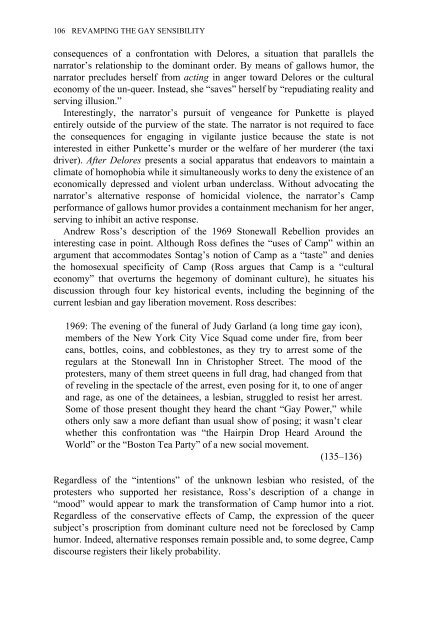Edited by Moe Meyer - Get a Free Blog
Edited by Moe Meyer - Get a Free Blog
Edited by Moe Meyer - Get a Free Blog
You also want an ePaper? Increase the reach of your titles
YUMPU automatically turns print PDFs into web optimized ePapers that Google loves.
106 REVAMPING THE GAY SENSIBILITY<br />
consequences of a confrontation with Delores, a situation that parallels the<br />
narrator’s relationship to the dominant order. By means of gallows humor, the<br />
narrator precludes herself from acting in anger toward Delores or the cultural<br />
economy of the un-queer. Instead, she “saves” herself <strong>by</strong> “repudiating reality and<br />
serving illusion.”<br />
Interestingly, the narrator’s pursuit of vengeance for Punkette is played<br />
entirely outside of the purview of the state. The narrator is not required to face<br />
the consequences for engaging in vigilante justice because the state is not<br />
interested in either Punkette’s murder or the welfare of her murderer (the taxi<br />
driver). After Delores presents a social apparatus that endeavors to maintain a<br />
climate of homophobia while it simultaneously works to deny the existence of an<br />
economically depressed and violent urban underclass. Without advocating the<br />
narrator’s alternative response of homicidal violence, the narrator’s Camp<br />
performance of gallows humor provides a containment mechanism for her anger,<br />
serving to inhibit an active response.<br />
Andrew Ross’s description of the 1969 Stonewall Rebellion provides an<br />
interesting case in point. Although Ross defines the “uses of Camp” within an<br />
argument that accommodates Sontag’s notion of Camp as a “taste” and denies<br />
the homosexual specificity of Camp (Ross argues that Camp is a “cultural<br />
economy” that overturns the hegemony of dominant culture), he situates his<br />
discussion through four key historical events, including the beginning of the<br />
current lesbian and gay liberation movement. Ross describes:<br />
1969: The evening of the funeral of Judy Garland (a long time gay icon),<br />
members of the New York City Vice Squad come under fire, from beer<br />
cans, bottles, coins, and cobblestones, as they try to arrest some of the<br />
regulars at the Stonewall Inn in Christopher Street. The mood of the<br />
protesters, many of them street queens in full drag, had changed from that<br />
of reveling in the spectacle of the arrest, even posing for it, to one of anger<br />
and rage, as one of the detainees, a lesbian, struggled to resist her arrest.<br />
Some of those present thought they heard the chant “Gay Power,” while<br />
others only saw a more defiant than usual show of posing; it wasn’t clear<br />
whether this confrontation was “the Hairpin Drop Heard Around the<br />
World” or the “Boston Tea Party” of a new social movement.<br />
(135–136)<br />
Regardless of the “intentions” of the unknown lesbian who resisted, of the<br />
protesters who supported her resistance, Ross’s description of a change in<br />
“mood” would appear to mark the transformation of Camp humor into a riot.<br />
Regardless of the conservative effects of Camp, the expression of the queer<br />
subject’s proscription from dominant culture need not be foreclosed <strong>by</strong> Camp<br />
humor. Indeed, alternative responses remain possible and, to some degree, Camp<br />
discourse registers their likely probability.


